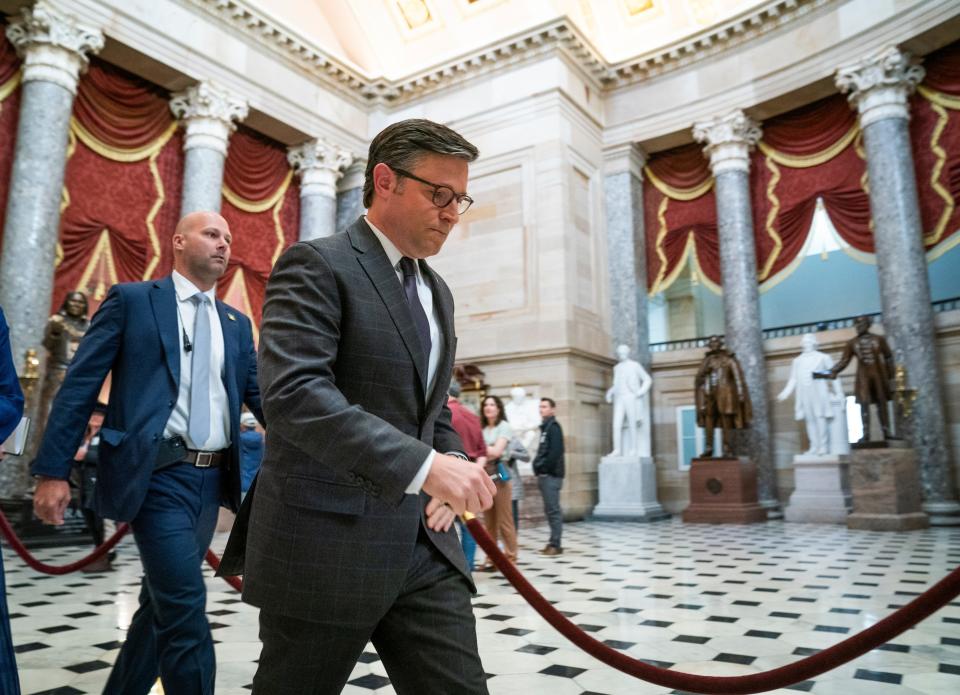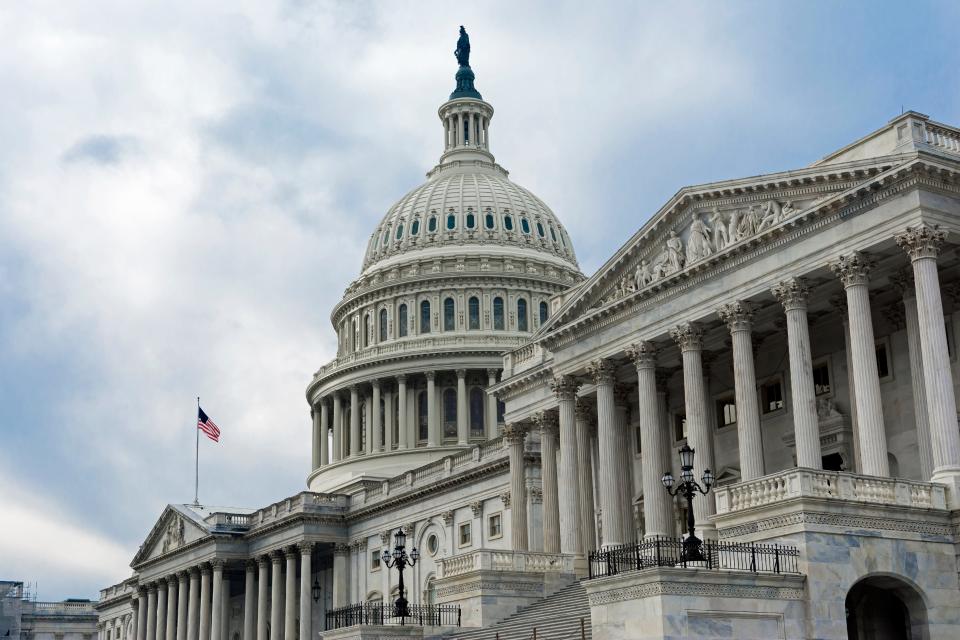House Speaker Mike Johnson's plan to avert a government shutdown gets blowback from conservatives, but support from Democrats
Live updates: House will vote on continuing resolution to avert government shutdown. How it affects you
WASHINGTON – House Speaker Mike Johnson’s proposal to fund the government is facing serious pushback from a handful of ultraconservative lawmakers, setting up yet another showdown within the House Republican conference ahead of a potential government shutdown Friday.
The newly installed speaker has proposed a two-step extension of current funding levels to appease members who oppose a massive spending package passed just before Christmas. Part of the government – including public health, military construction, housing, transportation, agriculture and energy programs – would be funded until Jan. 19, with the rest funded through Feb. 2.
The House plans to vote on the proposal as early as Tuesday.
The resistance Johnson, R-La., is seeing from hard-right GOP members reflects the deep divisions that have roiled the House Republican conference ever since they took control of the lower chamber in January.
“I will not support a status quo that fails to acknowledge fiscal irresponsibility, and changes absolutely nothing while emboldening a do-nothing Senate and a fiscally illiterate president,” Rep. Scott Perry, R-Pa., chair of the House Freedom Caucus said in a post on X, formerly Twitter.
The continuing resolution’s two phased-approach “doesn’t change” the fact that the plan still continues current funding levels, Rep. Chip Roy, R-Texas, another member of the Freedom Caucus, told reporters Monday, noting “it’s still a clean CR.”
Perry and Roy, along with other House conservatives including Reps. Tim Burchett of Tennessee, Andrew Clyde of Georgia, Bob Good of Virginia and Marjorie Taylor Greene of Georgia outnumber Johnson’s razor-thin, three-seat majority in the House.
"I think its a failure," Greene said of Johnson's first big move as Speaker. "I am not carrying on Nancy Pelosi's budget...I think we should be holding the line."
As a result of the stiff opposition Johnson’s continuing resolution is facing, the plan must also gain support from Democrats, who refuse to support an extension that includes conservative policy priorities−putting Johnson in between two factions with the power to derail federal funding.

Biden doesn't rule out Johnson's government funding plan: 'Wait and see'
The good news for Johnson however is that the White House and Democrats haven't ruled out the continuing resolution even though the two-phased approach isn’t their preference because it retains funding at current levels. Their openness to Johnson's proposal lowers the prospect of a government shutdown but it is unclear just how much Democratic support Johnson will need on the House floor.
Senate Majority Leader Chuck Schumer, D-N.Y. said on the Senate floor Monday he was “pleased that Speaker Johnson seems to be moving in our direction by advancing a CR that does not include the highly partisan cuts that Democrats have warned against,” but added that the plan is “far from perfect.”
President Joe Biden told reporters Monday that he hasn’t made up his mind on the tiered extension: “Let’s wait and see what they come up with,” he said.
The president’s open-ended answer is a markedly different response to Johnson’s continuing resolution compared to other GOP-backed legislation that he has issued veto threats to.
But Democrats are not necessarily happy about the development. The leading Democrat on the House Rules Committee, Rep. Jim McGovern of Massachusetts, said the “bizarre” version of a continuing resolution represents “a last minute hail mary” that will only make a future shutdown more likely.
Republicans “have made clear that in a divided government, they will refuse to work with anyone outside their caucus,” he said. “Same circus, new ringmaster.”
Rep. Steny Hoyer, D-Md., the most senior House Democrat and a member of the Appropriations Committee said the plan is likely to pass, but called it a "sad thing" for the House: "We are setting up ongoing crisis so that we will never come to rest and make a decision, which is bad for government, bad for the American people, and bad for the image of America."
The anger the continuing resolution has drawn from conservative members has prompted concerns that a handful of them could tank the bill in a procedural vote known as a rule vote, which traditionally passes along party lines regardless of support for the legislation. Hard-right members have broken that precedent multiple times this year, shooting down multiple GOP-backed bills unamicable to their conservative demands.
House GOP leadership moved to put the continuing resolution on the floor under suspension, a procedural move that dodges a rule vote but requires the funding plan to pass with two-thirds support of the lower chamber instead of a simple majority, meaning the continuing resolution will require heavy Democratic support.
Johnson's move to put the bill under suspension is expected to receive heavy blowback from conservatives. Roy told reporters "it would be a very bad idea" for the continuing resolution to avoid a rule vote.

Why is Congress facing a government shutdown?
Despite the vocal opposition, most members are preparing to help Johnson pass a “clean” funding extension just weeks after they toppled former House Speaker Kevin McCarthy, R-Calif., for doing the same thing.
The federal budget is due every year at the end of September. But this year, Washington faced a separate deadline: A default on the national debt, which was narrowly avoided through a deal struck between McCarthy and Biden.
As a part of that deal, Congressional Republicans convinced the White House to agree to significant cuts in discretionary spending for the 2024 fiscal year and to limit spending to 1% growth in fiscal year 2025.
But when the time came to pass that budget, McCarthy told appropriators to set spending levels below what he agreed to with Biden, under pressure from the right wing of his caucus and against the protests of Democrats.
As the fiscal year came to a close in September, GOP hardliners resisted a stopgap spending measure. House Democrats eventually helped McCarthy pass a funding extension through Nov. 17 – prompting the mutiny that led to McCarthy’s ouster.
After three long weeks without a Speaker, Johnson took the leadership mantle with just over three more weeks until that deadline, setting up a new budget fight.
How would a government shutdown affect me?
While there’s plenty to be resolved before the deadline Friday night, members have a powerful incentive to come to an agreement and avoid a shutdown.
If Congress can’t pass all 12 appropriations bills by the deadline, federal agencies must stop any work that isn’t considered essential.
Essential services include air traffic control and law enforcement – those employees continue to work, but don’t get paid until the shutdown is over, so it could eventually lead to flight delays and other inconveniences if the funding gap stretched on and people stopped reporting to work, affecting more Americans beyond just federal employees.
Social Security, Medicare and Medicaid benefits would continue, but other services could be delayed such as benefit verifications or the issuance of Medicare replacement cards. Passport and visa services would also likely slow down.
Food assistance – the Special Supplemental Nutrition Program – could be impacted quickly, as backup funding would likely dry up quickly and require states to fund the program themselves until Congress approves a budget.

This article originally appeared on USA TODAY: Mike Johnson's plan to avert government shutdown gets Dem support

